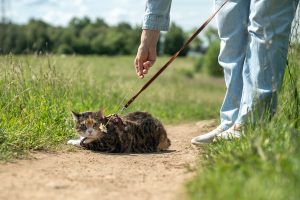Pet Desexing Brisbane
At The House Call Vet, we are committed to promoting responsible pet ownership by offering safe, reliable, and compassionate desexing solutions for cats and dogs in Brisbane.
Dog & Cat Desexing Care in Brisbane
Helping You Be Responsible Pet Parents
Across Australia, there is an influx of animals in shelters waiting to be adopted into safe and loving homes. As part of the battle against pet overpopulation, pet desexing is crucial.
As experts in pet health and desexing services, we’re dedicated to making the process smooth and stress-free for both you and your beloved companion. What’s more? We offer flexible booking benefits that allow us to book similar procedures on the same day, optimising our schedule for efficiency and passing on the savings to you!
From consultation to post-operative care, we’ll be by your side every step of the way, ensuring the utmost comfort and care for your pet. Schedule a consultation with The House Call Vet and make a difference in your pet’s life today!

Why You Should Desex Your Pet
Making a Difference, One Pet at a Time
Not only is desexing an effective strategy to prevent unwanted litters and reduce the number of puppies and kittens ending up in animal shelters, but there are a number of health benefits for your pet as well. Performed under general anaesthetic, our desexing services are a relatively quick and straightforward procedure.
In female dogs and cats, desexing prevents unwanted pregnancies and automatically eliminates the associated unwanted attention from their male counterparts. In male dogs and cats, desexing will not only prevent unwanted pregnancies but also help to reduce testosterone-driven behaviours such as roaming, mounting and urine marking.
Additional Benefits Include:
- Reduces the risk of mammary tumours
- Prevents other conditions & infections
- Eliminates the risk of tumours in the ovaries and uterus
- Reduces the risk of prostatic diseases
- Reduces the risk of perianal tumours
- Eliminates the risk of testicular cancers
Testimonials
What Our Clients Have To Say!
Desexing for Happier, Healthier Pets
Safeguarding Your Pet's Well-being
At The House Call Vet, we understand the importance of ensuring the long-term health and happiness of your furry companions. When it comes to desexing your dog, whether male or female, our expert team is here to provide compassionate care and professional solutions tailored to their specific needs. With our expertise and dedication, you can trust that your dog will receive the highest quality care and attention throughout the desexing process!
Dog Desexing
Desexing not only prevents unwanted litters in female dogs but also reduces behavioural issues and lowers the risk of serious health problems like uterine infections and mammary gland cancer. For male dogs, it curbs aggression and roaming instincts, while also eliminating strong urine odour. Trust us to provide compassionate care and professional expertise for a healthier, happier future for your beloved canine companion.
Cat Desexing
We understand the importance of early intervention when it comes to desexing your cat. Female cats can enter their reproductive cycle as young as four and a half months of age, making early desexing essential in preventing unwanted pregnancies and the associated risks! Whether male cats or female cats, desexing offers crucial benefits, such as preventing testicular cancer in males and mammary gland cancer and uterine infections in females.
Dog & Cat Desexing Care
Caring For Your Pet After Their Treatment
Desexing is typically a day procedure which means your pet can usually go home the same day.
Classified as a major surgery, it’s important to look after your pet properly once they return home. From monitoring wounds and encouraging eating to providing your pet with a warm, clean and cosy spot to recovery, your care can make a real difference to their comfort and recovery.
We will provide you with all of the information you need to care for your pet post-operatively, and we are always available to answer any questions or concerns you may have.
It is normal for your pet to have some swelling, bruising and discomfort around the incision site. Pets are generally compulsive cleaners, they may lick or bite the area excessively.
To avoid irritation, be sure to monitor the area closely and keep it clean and dry. If you are concerned about the appearance of the wound or your pet’s behaviour, please don’t hesitate to contact us.
After the procedure, your companion my be groggy and weary. Be sure to keep them comfortable to encourage proper recovers. It is also important to avoid excessive stress and activity.
It is not unusual for pets to have a decreased appetite following surgery. However, to help them recover, it is important to ensure that they are eating and drinking properly
Encourage eating by offering small, frequent meals of their wet food. If your pet refuses to eat, please contact us immediately.
While your pet is recovering from its procedure, exercise should be controlled and limited. They can be taken for short, slow walks with jumping and running should be discouraged and avoided.
More About Pet Desexing
Frequently Asked Questions
The House Call Vet is here to help you understand the importance of desexing your pet and provide you with all of the information you need to make the best decision for your animal companion. Have another question? Get in touch with The House Call Vet today and our team of experts can assist.
When Can My Pet Be Desexed?
Desexing is generally recommended when pets are approaching sexual maturity but before coming on heat. As such, the recommended age for desexing your pet is typically between 4-6 months old, however this may vary depending on the type of animal.
However, at The House Call Vet, we know that each of our patients are unique. With years of experience, our team will be able to advise you on the best time to desex your pet based on their individual health and development. We will take every consideration into account to ensure that your pet is comfortable and safe throughout the entire process.
To book an appointment or for more information, please don’t hesitate to contact us today.
Is desexing painful?
No, desexing is not typically painful for pets. Like any surgical procedure, there may be some tenderness immediately after the surgery, but most pets recover quickly.
We administer pain relief both before and after the procedure, and your pet will be discharged with a short course of pain relief medication to take at home for the first few days.
Will My Pet's Personality Change?
This is a common myth. However, desexing your companion will not change or alter their personality, but can improve certain behaviours.
Will My Pet Gain Weight?
Desexing does not cause weight gain or directly affect normal activity levels in your pet. However, if weight gain occurs after desexing, a simple adjustment to diet and activity can resolve this.
Should My Pet Have A Litter First?
For your pet’s health, it is recommended to desex your pet before their first heat. This greatly reduces their risk of mammary cancer.
Our Pet Care Services
The House Call Vet Blog
Keep Up To Date

Common Dog Diseases Every Pet Owner Should Know
Learn about some of the most common dog diseases. Discover the signs, symptoms and treatments to keep your pup happy and healthy.

Common Behavioural Issues In Pets (And What To Do About Them!)
Learn about some of the most common dog diseases. Discover the signs, symptoms and treatments to keep your pup happy and healthy.

Can You Walk A Cat? A Guide To Safe Leash Walking
Ever wondered if you can take your cat for a walk? While cats aren’t like dogs, some felines can enjoy safe outdoor adventures with the right training and equipment.

